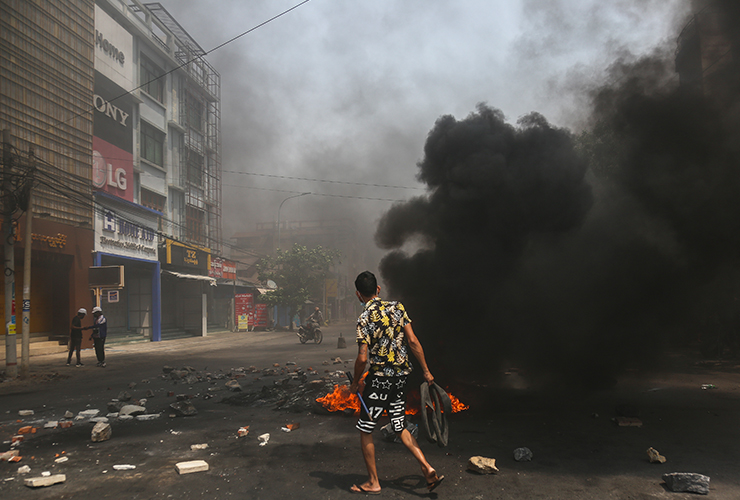The International Press Institute (IPI), a global network of editors, media managers and leading journalists for press freedom, today vehemently condemned the ongoing repression of journalists in Myanmar as well as the military regime’s brutal crackdown on protests.
After two weeks under arrest, Polish photojournalist Robert Bociaga was deported this week from Myanmar. From abroad, he called on the international community to increase pressure on the country’s military junta over its seizure of power and targeting of civilians. Otherwise, he feared, the situation in Myanmar could turn into an even greater tragedy. “If the international community (does) not react in a more decisive way, this situation will only aggravate into a regional crisis” Bociaga told The Associated Press in a remote video interview.
Bociaga was detained on March 11, part of the military’s crackdown on the media. According to media reports, at least 46 journalists have been detained since the military coup. Additionally, several newsrooms were raided by security forces and/or had their licences revoked, including Myanmar Now, Mizzima, DVB, Khit Thit Media and 7Day News.
Most recently, last Wednesday, March 24, following an overnight raid, four employees of the media outlet Kanbawza Tai News were arrested by security forces. Editor-in-Chief Nann Nann Tai, news reporter Nann Win Yi, publisher U Tin Aung Kyaw and security guard Ko Sai Sithu were released the evening of the following day.
Last week, Associated Press journalist, Thein Zaw, was released from prison after being detained for more than three weeks over his coverage of the protests. At the time of his release, however, at least 20 other journalists were still in prison.
Meanwhile, the military junta in Myanmar has repeatedly shut down the internet, blocking mobile data for over two weeks and restricting content on online platforms, as reported by the internet monitoring group NetBlocks.
“The media crackdown in Myanmar shows no sign of ending. Effective international pressure must be raised further to stop the arrests and targeting of reporters in the country”, IPI Deputy Director Scott Griffen said. “The detentions of both foreign and local journalists are an effort to intimidate the entire media community in Myanmar and throw a blanket of silence over the increasingly heinous crimes committed by the military regime.”
Journalists continue to work under high risk
“If you wear a press jacket or camera, you’re likely a target”, a freelance journalist from Myanmar, who preferred to remain anonymous, told IPI. “Over the weekend a photographer was shot in the hand while he was trying to take pictures of the armed forces. It’s just very dangerous for journalists to be in Myanmar at the moment.”
“Myanmar has always been a dangerous place for journalists, it didn’t change overnight”, she explained. Journalists had also faced harassment, threats and lawsuits in recent years. However, since the coup “things have become more and more difficult for journalists to operate”, she said.
Many journalists are in hiding and have not slept in their homes since early February. According to the freelance journalist, those who work for media outlets that have had their licences revoked are especially at risk of being arrested while covering the protests, as they may need to show identification.
“So far, the only journalists that have been released are either foreigners themselves or work for foreign media”, she said. Because of recent developments, many foreign journalists have had to leave the country or are planning to.
A lot of the local media outlets are still very active, she said. “They have not stopped reporting but a lot of them had to re-evaluate how they do it”. Many journalists rely on members of the public to send them information and pictures. This makes is harder to verify the information, she explained, as “you can no longer just go and see it”.
Ongoing protests
As of March 30, the local human rights organization Assistance Association for Political Prisoners reported that a total of 2,608 people had been detained and at least 521 killed as a result of the military coup that took place in early February.
The past weekend marked a new peak in the brutality: last Saturday alone, at least 114 people, including children, were killed by security forces across the country.
The regime has reportedly launched numerous airstrikes in the south-eastern state of Karen since Saturday night, forcing thousands of residents to flee towards Thailand.
On Monday, March 29, the United Nations called on the military regime to “immediately stop killing the very people it has the duty to serve and protect”.
Following the brutal crackdown on last weekend’s protests by military forces, the U.S. State Department ordered all non-essential personnel and their family members to leave Myanmar, while announcing further sanctions against the military regime.
So far, international pressure and sanctions appear to have had little effect on the junta.
